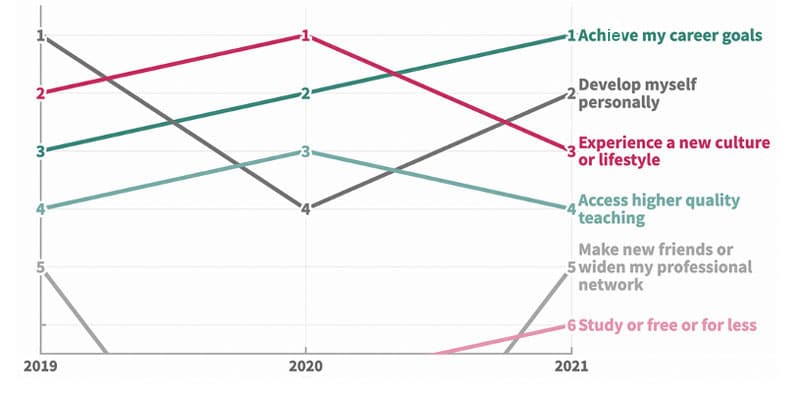Surveys show that career outcomes outweigh rankings for many prospective international students
- Recent surveys indicate students are becoming less attached to the idea of studying in a particular country while becoming more focused on whether an institution can provide them with skills for their careers
- Rankings are less important than value for money in many source markets
- Students are also more concerned about safety, including mental health supports
A new global study from Educations.com provides a number of striking insights about the changing factors influencing where, and with which institutions, international students choose to study abroad. The survey collected responses from over 10,000 prospective students in 181 countries, and previous survey data provided trend tracking across 2019, 2020, and 2021.
The findings suggest that school rankings are becoming less important than graduation outcomes in terms of their influence on decision-making and that students are less committed than in the past to studying in a particular country.
Instead, students want to attend schools and universities that offer value for money, strong student supports, and return on investment. They are concerned about safety and worried about the possibility of facing racial discrimination. And they want to talk to current international students about their experience before making a decision about where to apply and enrol.
South Korea rising
As many other surveys conducted over the course of the pandemic have shown, Canada has become much more popular among students – almost as popular as the UK and US. In contrast to the declining or stagnant share of the UK and US, Canada gained 10% in student interest over 2020 and 14% compared with 2019.
South Korea – where there are now a number of English-taught programmes – is also becoming much more attractive to international students. Compared with 2020, finds Educations.com, “more than double the proportion of prospective international students surveyed say they want to study abroad” in South Korea … perhaps driven by the South Korean government’s ambitious Study in Korea initiative. Their hypothesis seems solid: WENR reports that, “In 2018, the number of international students enrolled in degree and non-degree programmes [in South Korea] reached a record high of 142,205, after growing by 70 percent over 2014.”
Institution over country
IDP surveys over the past couple of years have shown a remarkable – and COVID-related – willingness on the part of international students to switch destinations for in-person learning. The Educations.com survey offers further proof that many students are less committed to a particular destination than they are to the opportunity of attending a school that promises to offer them a positive and successful study abroad experience.
Specifically:
- “African, European, and Asian students are especially more interested in looking at the institution first since 2019, with an increase of 133%, 96%, and 93% respectively.
- The country [as a top influence] has decreased in importance over the last two years in Latin America by 38%, in Europe by 34%, and by 25% in North America.”
Separately, a survey by INTO University Partnerships detected a trend of international students evaluating institutions on factors other than rankings:
“The majority of Gen Z – 72% – places greater importance on the ability of a university to give them the skills they need for their future than a university’s ranking. Only 17% of Gen Z believe it is important to go to an elite, highly ranked university, even if doing so is more expensive.”
The INTO survey found that Nigerian and Kenyan students “are the most focused on degree outcomes, with 81% and 86% reporting that degree outcomes are more important to them than ranking, respectively.” By comparison, 42% of Chinese students considered a university’s rankings more important than degree outcomes and 43% said degree outcomes are more important.
INTO’s survey was conducted with 1,200 prospective students under the age of 25 in 93 countries including China, India, Nigeria, Kenya, Japan, Australia, and Brazil.
Careers the top priority
When students are evaluating a potential school or university, they are primarily looking for cues that the institution will offer a strong return on investment by setting them up for career success. As illustrated in the Educations.com chart below, “achieving career goals” has risen from third place in 2019 to first in 2021, while the opportunity to “experience a new culture or lifestyle” has become less influential on students’ decision-making.

The intense focus on careers makes sense in a more uncertain and rapidly evolving global economy. Among other impacts, the pandemic has dramatically altered employment prospects in certain fields and ushered in new demand for certain skills. For example, the OECD reports that in Australia, Canada, New Zealand, the United Kingdom and the United States,
“Demand for workers in ‘front-line’ sectors, or in those involved in the management of the COVID 19 pandemic, was very strong as demonstrated by either a growing number of jobs advertised or a less steep decline in postings relative to other sectors. [There was] a strong increase in the demand for technical competencies in the healthcare sector, such as ‘emergency and intensive care’ or ‘basic patient care,’ relative to the pre-crisis period … transversal skills, such as ‘communication skills’ or ‘team work’ also remain in strong demand among the top most frequently advertised positions in the labour market.”
The OECD also found that “the changing nature of work due to COVID-19 containment measures led to an increase in the share of job postings advertising ‘working from home’ as a required condition, a trend that underlines the growing appetite for remote internships among students.
Safety and mental health also on the minds of many
More than two-thirds of students (69%) surveyed by Educations.com in 2021 said that an institution’s mental health services are “very important” to them when deciding where to study abroad, up from 60% in 2020, demonstrating the real toll the pandemic has had on students’ wellbeing.
Many students are also worried about whether they will face racial discrimination when studying abroad:
“Across Africa, 91% say they are concerned about their safety when thinking about studying abroad, with 60% of that percentage citing racial discrimination as their biggest source of unease. Proportions of apprehensive students are even higher In Asia. With 93% indicating safety concerns, 26% of this group of Asian students are thinking about potential racial discrimination, and 25% are worried about Asian-hate abroad.”
The findings around mental health and fears for safety underline the key role of student support staff at institutions who can reassure and assist prospective students and current students alike. This staff function has become infinitely more important as a result of the pandemic.
Students rely heavily on peer-to-peer
The wisdom of incorporating student ambassadors into marketing was highlighted in Educations.com findings. Fully 63% of prospective students wanted to talk to current international students before applying, compared with only 17% who wanted to talk to alumni. In many ways, deciding where to study abroad has become more difficult for prospective students because of the pandemic. It isn’t surprising, therefore, to see that they want to check in with current students studying in this unprecedented time to discern whether enrolling at a given school will be a positive experience.
For additional background, please see:


















